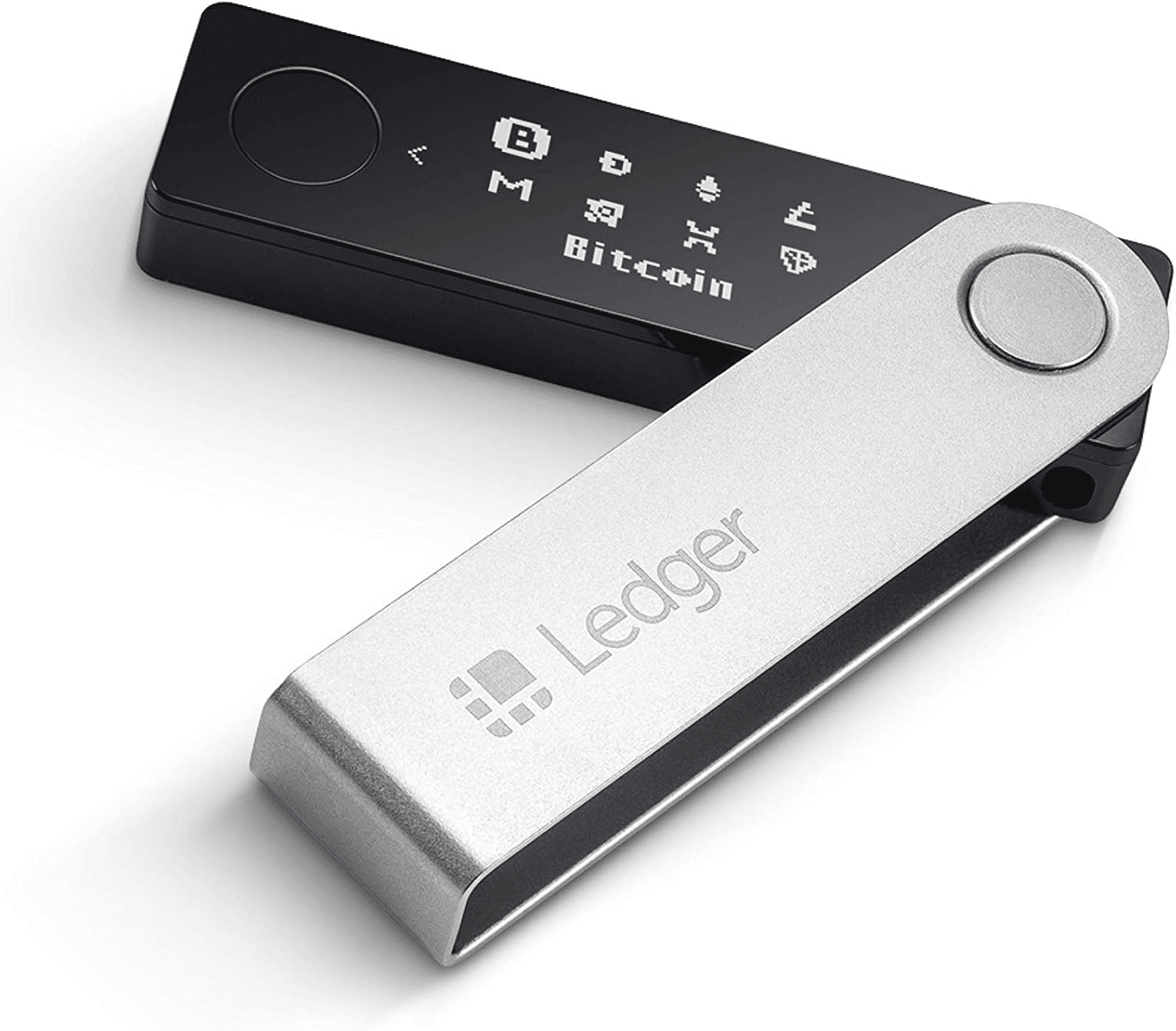This article analyzes the Best Crypto Hardware Wallet options available today, emphasizing features, security, supported currencies, and pricing.
As the name suggests, hardware wallets offline store private keys to provide security for digital assets, and are thus vital for keeping digital assets safe. Whether a novice or seasoned investor, having the right hardware wallet guarantees utmost security for cryptocurrencies.
What is a Hardware Wallet?
A hardware wallet is a tangible device created specifically for the offline storage of cryptocurrency private keys, shielding them from hacks, malware, and phishing threats. As with software wallets, it keeps your digital assets isolated from internet-connected devices—this offers maximum security.
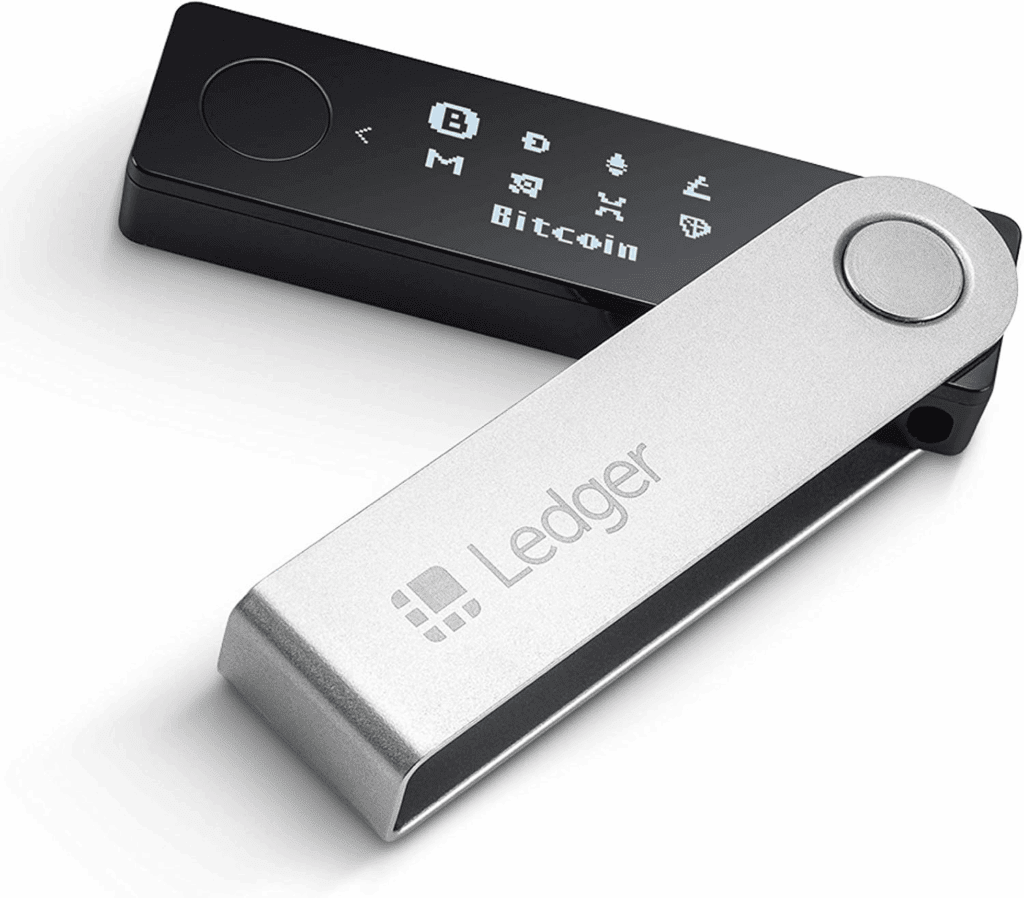
Users only plug the device to a computer or a smartphone for transactions and authorize them from the device. Popular models include Ledger, Trezor, and Coldcard. With the rapid increase of cryptocurrency exchanges and a high number of hackers around the world, it is considered a hardware wallet is one of the most secure ways of managing and protecting cryptocurrencies long-term.
How Do Crypto Hardware Wallets Work?
Offline Key Storage – Prevents unauthorized hacks by keeping the crypto private keys inaccessible through the internet.
Transaction Signing – The wallet performs internal key signing for transactions so the private key remains secure.
Device Connection – Users can initiate transactions by connecting the hardware wallet to a computer or smartphone using USB or Bluetooth.
Verification on Device – Transactions are verified on the hardware wallet for added protection against hacks.
Backup & Recovery – Repairing or damaging the physical crypto wallet does not result in loss of funds through the use of recovery phrases.
Key Point & Best Crypto Hardware Wallet List
| Hardware Wallet | Key Features |
|---|---|
| Ledger Nano S | Compact, USB-based, supports 1,800+ cryptocurrencies, secure offline storage |
| Trezor Model T | Touchscreen, supports 1,600+ coins, advanced security, open-source firmware |
| CoolWallet S | Card-style, Bluetooth-enabled, mobile-friendly, waterproof design |
| KeepKey | Large screen, simple interface, supports 40+ cryptocurrencies, offline storage |
| BitBox 02 | Minimalist design, USB-C, microSD backup, multi-coin support |
| Ledger Nano X | Bluetooth-enabled, mobile and desktop compatible, supports 5,500+ tokens |
| Ellipal Titan | Air-gapped, fully metal body, QR code transaction signing, mobile app integration |
| Trezor One | Beginner-friendly, supports 1,600+ coins, secure PIN and passphrase setup |
| SafePal S1 | Air-gapped, QR code-based transactions, mobile app support, multi-chain compatible |
| D’CENT Biometric | Fingerprint authentication, Bluetooth-enabled, multi-coin support |
1. Ledger Nano S
The Ledger Nano S, established in 2014, remains one of the most accessible and secure hardware wallets on the market. The device holds over 1,800 cryptocurrencies, including Bitcoin, Ethereum, and Ripple, making it one of the most versatile hardware wallets.
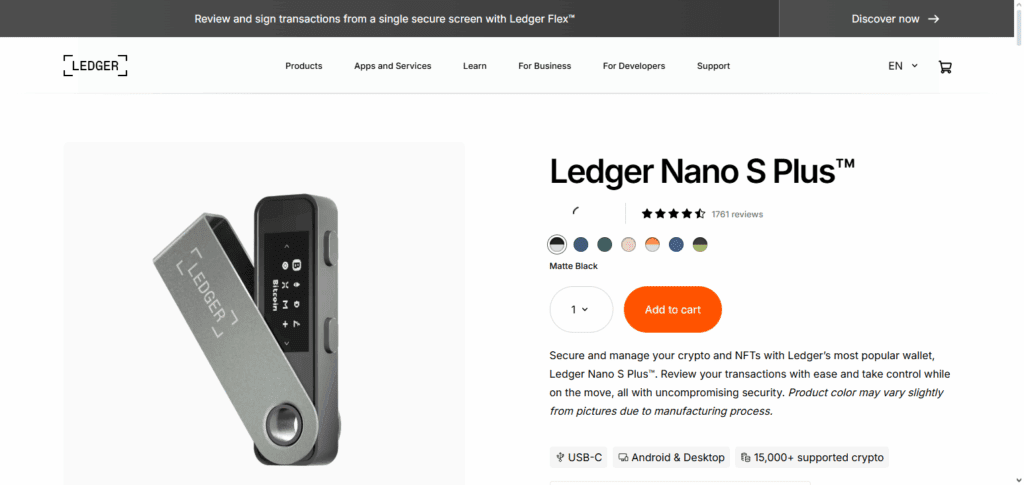
Ledger provides a streamlined customer experience, offering the device at a competitive one-time payment of $59. Ledger does not impose additional fees on transactions, making it easy to use.
The device seamlessly integrates with the Ledger Live application, aiding in efficient asset management. Due to the affordable price, comprehensive support, and high security, it is considered the Best Crypto Hardware Wallet.
Ledger Nano S Plus Features
- Compact design with a built-in screen.
- Supports over 5,500 cryptocurrencies.
- Connects via USB-C.
- Can be used with the Ledger Live app
Pros
- It’s cheap when compared to other wallets.
- Extremely easy to understand.
- Lots of positive feedback/patches.
Cons
- Everyone knows it’s a dog of a wallet.
- It’s too small, which means it doesn’t have Bluetooth.
- It looks horrible next to newer gadgets
2. Trezor Model T
SatoshiLabs launched Trezor Model T in 2018. It is a premium hardware wallet featuring a touchscreen interface and enhanced security. It supports over 1,600 cryptocurrencies, including Bitcoin, Ethereum, and multiple altcoins.
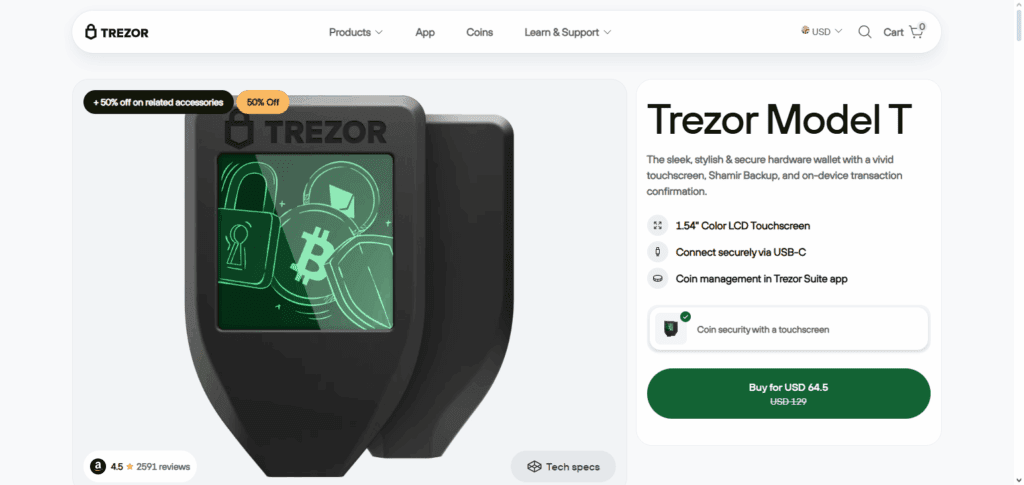
The device guarantees that private keys are protected from malware and hacking as they never leave the device’s secure enclave. It is priced at around $219 and comes with optional Shamir Backup and passphrase protection.
Тrezor Model T is also equipped with Trezor Suite for effortless portfolio management. With 24/7 resources and email support, Trezor is awarded as Best Crypto Hardware Wallet for seamless usability, comprehensive security, extensive crypto coverage, and exceptional protection.
Trezor Model T Features
- Has a 1.54 inch color screen.
- Supports more than 1,000 cryptocoins.
- USB-C connection.
- Works with Trezor Suite and other apps
Pros
- Strong security features like a PIN and passphrase.
- Online wallet is easy to use.
- Firmware does get newer versions.
Cons
- Can’t keep it on a big shelf, it’s heavy.
- Does not offer crypto staking.
3.CoolWallet S
Established in 2016, CoolWallet S is a Bluetooth hardware wallet in the shape of a credit card, which is convenient to carry and is compatible with both iOS and Android.
It holds over 1000 cryptocurrencies such as Bitcoin, Ethereum, and Binance Tokens. The wallet allows mobile apps to sign transactions, ensuring that the private keys never leave the device.
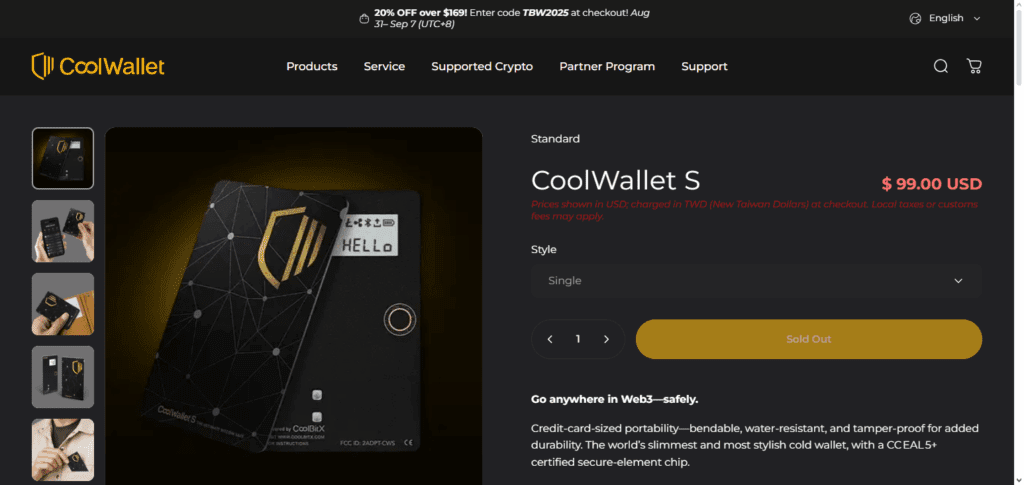
It is priced at 99 dollars and supports transactions over mobile network fees. It supports email, FAQs, and live chat for customer support.
Revered for its robust security and mobile convenience, the CoolWallet S is regarded as a Best Crypto Hardware Wallet, which is perfect for on-the-go users in need of solid cryptocurrency security.
CoolWallet S Features
- Compact design which is the side of a small credit card.
- Bluetooth capability.
- Supports major cryptocurrencies and all ERC-20 tokens.
- Exchange built in
Pros
- A wallet can be hidden in the hand.
- Good for 1 hour travel on a small boat.
- Has a high level of security
Cons
- Strong price in the competition.
- Too small compared to the competition.
- Complete range of functionalities only reachable via a smartphone
4.KeepKey
Founded in 2015 by ShapeShift, KeepKey is a Bitcoin, Ethereum, and Litecoin hardware wallet. KeepKey offers Bitcoin, Ethereum, Litecoin, and over 40+ cryptocurrency cryptocurrencies.
The wallet stores private keys securely offline and allows users to verify transactions through a large OLED screen. Depending on the sale, the wallet can be purchased for anywhere between \$49 and \$129, with no additional fees on transactions.
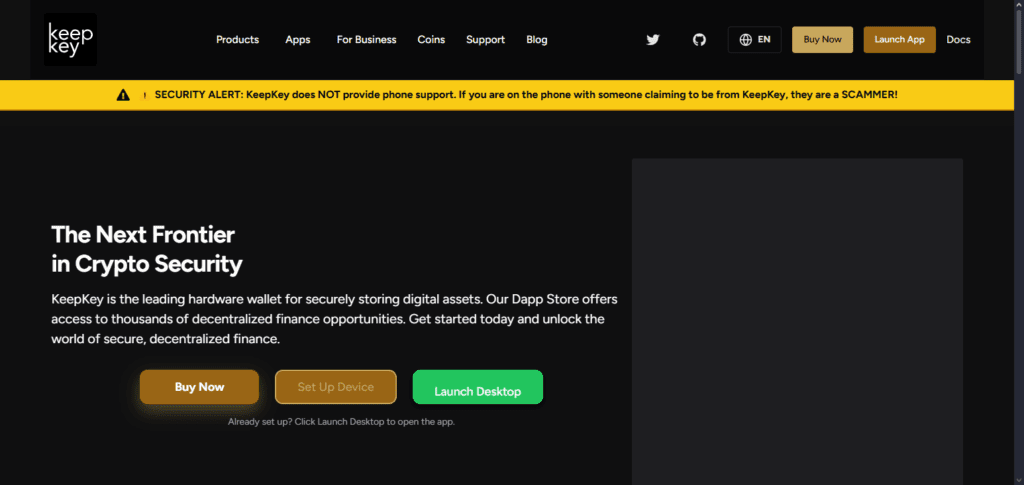
Users can easily manage their assets through ShapeShift’s integrated platform. ShapeShift offers email as a support channel, and users may browse through the knowledge base.
KeepKey’s award as Best Crypto Hardware Wallet is a testament to the effortless combination of security, portability, and ease of exchange, transaction, and conversion available to both novice and veteran investors in cryptocurrency.
KeepKey Features
- Large display
- Supports over 40 cryptocurrencies
- Connects via USB
- Integrates with ShapeShift for asset trading
Pros:
- User-friendly interface
- Affordable price point
Cons:
- Limited coin support
- No Bluetooth connectivity
- Bulkier design compared to other wallets
5.BitBox 02
Founded in 2015, Shift Cryptosecurity offers the BitBox 02, a Swiss-designed hardware wallet. This wallet features strong security with a dual-chip architecture and a microSD backup option. It supports Bitcoin, Ethereum, Litecoin, and other major altcoins.
The device costs approximately \$149. Like other wallets, BitBox 02 is free of transaction fees, though network fees will apply.
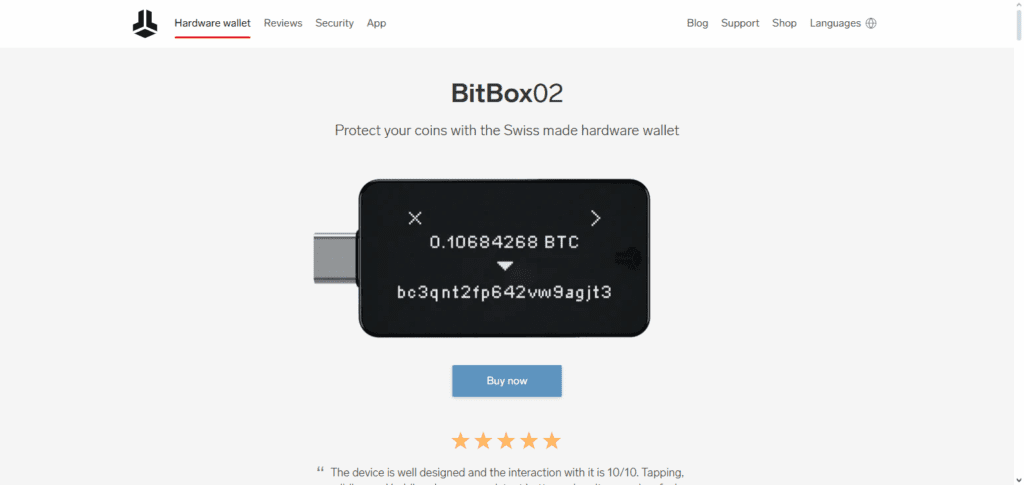
BitBox 02 comes with BitBoxApp, which facilitates the management of assets and the firmware of the device. Customer support includes email, tutorials, and documentation.
BitBox 02 is renowned for its security and simplicity, making it ideal for privacy and crypto enthusiasts. This is why it is highlighted as a Best Crypto Hardware Wallet.
BitBox02 Features
- Compact design
- Supports major cryptocurrencies
- Connects via USB-C
- Works with BitBoxApp.
Pros:
- Secure with excellent design
- Decentralized finance support
- Easy user interface.
Cons:
- No iOS app support
- Limited coin support compared to competitors
- Higher price point
6. Ledger Nano X
The Ledger Nano X is an updated version of the Ledger Nano S, released in 2019 with Bluetooth capability and a larger screen. It enables the management of more than 1800 cryptocurrencies, offering mobile and desktop app management. Moreover, the device protects private keys using secure element chips (CC EAL5+).
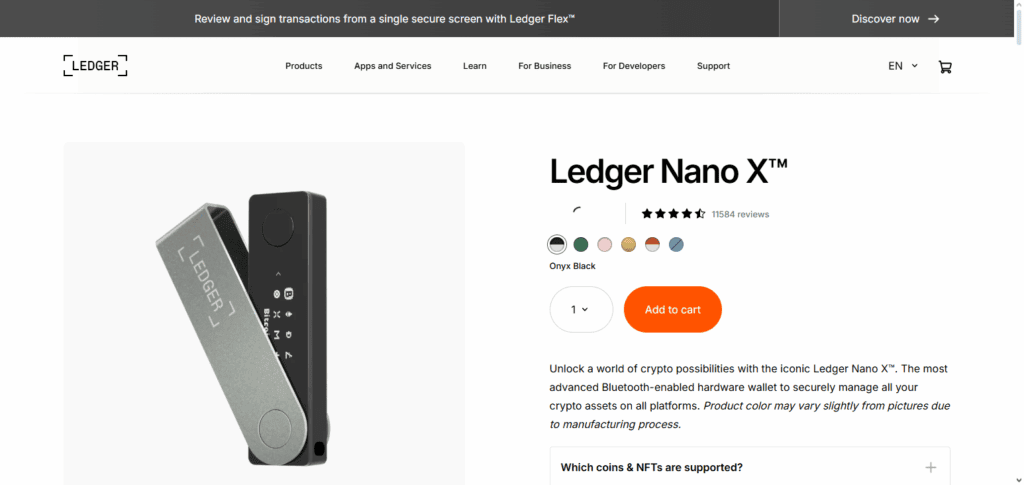
It costs approximately $149, offering free firmware updates, no internal fees, and comprehensive email support. With tutorials and Ledger Live offered for portfolio management, as a Best Crypto Hardware Wallet, the Nano X is unrivaled in multi-asset support, mobile management, and stringent security for serious investors.
- Ledger Nano X*
Features:
- Bluetooth
- Supports over 5,500 cryptocurrencies
- Connects via USB-C
- Works with the Ledger Live app ([CryptoVantage][9], [WIRED][4]).
Pros:
- Large storage
- Easy interface
- Supports NFTs.
Cons:
- Higher price point
- Bulky design
- Bluetooth connection raises security concerns over the device
7. Ellipal Titan
Released in 2019, Ellipal Titan is the first fully air-gapped hardware wallet offering support for 10,000 cryptocurrencies. Its unique QR-code-only interface guarantees no internet or network connections, preventing private key hacking. Ellipal Titan is priced at around $169 and is integrated with Ellipal mobile apps for transaction signing.
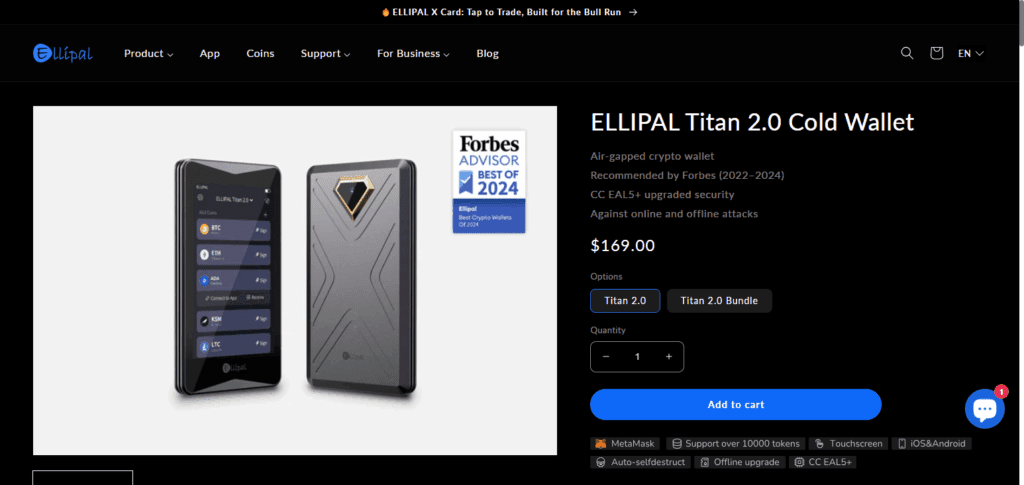
Email assistance is provided along with an FAQ and a community forum. Ellipal Titan is known for its extreme security measures, sustained offline operation, and is regarded as the Best Crypto Hardware Wallet for users prioritizing cold storage and resistance to digital and hacking attacks.
Ellipal Titan 2.0 Features
- Supports 10,000+ cryptocurrencies.
- QR code connection
- Syncs with the Ellipal app.
Pros:
- No chance of being hacked because of the air-gapped design
- Large screen
- Supports a long list of cryptocurrencies
Cons:
- The design is bulkier
- More expensive
- No Bluetooth (wireless) support
8. Trezor One
Launched back in 2014 by SatoshiLabs, Trezor One is the world’s first hardware wallet. It supports more than 1600 cryptocurrencies, including Bitcoin, Ethereum, and all ERC20 tokens. Its features include offline key storage, a PIN code, and backup recovery seeds. Trezor fees are around 79 dollars, with only network fees towards transactions.

With the Trezor suite, users can manage their assets and update the firmware. Trezor provides customer support through email and has online documentation.
Trezor has been reviewed as the best hardware wallet and is recommended due to having a great balance between simplicity and strong security features, which makes it a great device for beginners as well as long-term investors.
Trezor One Features
- An oLED screen
- Has support for over 1,000 cryptocurrencies
- USB connectivity
- Works with Trezor Suite and 3rd party software
Pros:
- One of the cheaper options
- Has a simple design that is easy to use
- Users will receive a continuous flow of updates for the software
Cons:
- Doesn’t support as many coins as the newly designed versions
- Lacks Bluetooth functionality
- Has a less impressive screen
9. Safepal S1
Launched in 2018, the Safepal S1 is a mobile hardware wallet that covers more than 30 blockchains and over 10,000 tokens, including Bitcoin and Ethereum.
Safepal S1 devices utilize air-gapped offline transaction signing with encrypted QR codes to secure transactions. The device Safepal S1 is sold at around 49 dollars and does not carry any internal fees aside from network fees.

Safepal S1 integrates with the Safepal mobile app for asset management as well as tracking and interacting with decentralized finance.
Safepal offers comprehensive customer support through emails, live chats, and a help center. Safepal has also been reviewed and listed as one of the best hardware wallets for it’s low price and versatility.
SafePal S1 Features
- Completely air-gapped
- Has support for over 10,000 cryptocurrencies
- QR code connection
- Works with the SafePal app
Pros:
- No internet connection, hence no chance of being hacked
- Low price
- Supports a long list of cryptocurrencies
Cons:
- The design is bulkier
- No Bluetooth functionality
- The screen is smaller
10. D’CENT Biometric
D’CENT Biometric is a cryptocurrency wallet with fingerprint biometric security features that was launched in 2019. It is a hardware wallet that secures private keys with Bitcoin, Ethereum, Ripple, and 30+ other cryptocurrencies. The wallet is sold for $149, and only network fees are charged in addition to the base price.
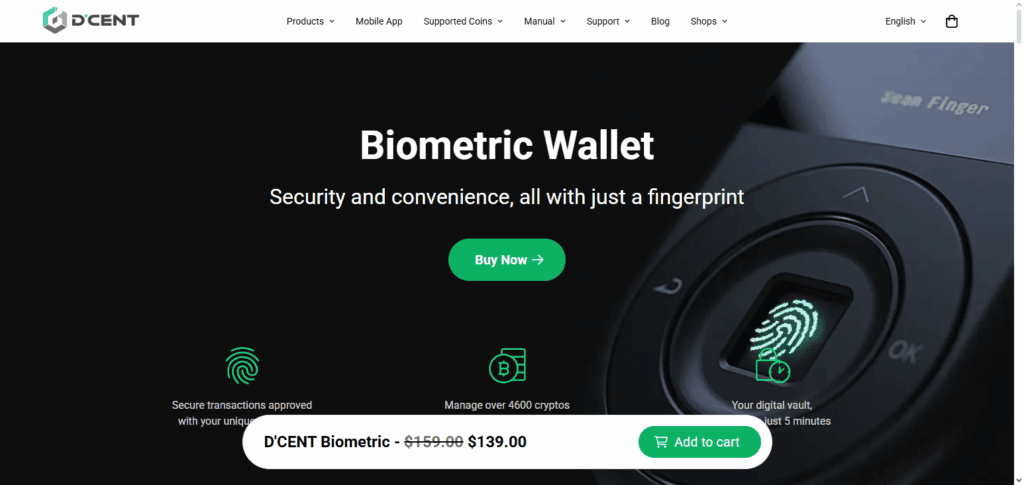
D’CENT Biometric is compatible with the D’CENT app, which is used for managing assets, signing transactions, and performing device firmware updates. Guidance and technical help is provided through emails and online platforms.
D’CENT Biometric is well known for biometric security and for being easy to use. It has received awards for being the Best Crypto Hardware Wallet, as it provides unmatched protection and convenience for light and professional crypto investors alike.
D’CENT Biometric Features
- Fingerprint scanning
- Has support for over 1,000 cryptocurrencies
- USB connectivity
- Works with the D’CENT app
Pros:
- The only biometric wallet that offers fingerprint scanning
- Has simple design and very easy to use
- Users will receive a continuous flow of updates for the software
Cons:
- More expensive than most options available
- Supports fewer coins than other competitors
- Lacks Bluetooth functionality
Pros & Cons of Crypto Hardware Wallet
Pros of Crypto Hardware Wallets
- High-security private keys are kept offline, making them immune to remote hacking and malware.
- Multi-Currency Support Most wallets can accommodate thousands of coins and tokens.
- User Control Private keys grant complete ownership, independent of custodial services.
- Backup and Recovery Funds can be safeguarded through recovery options, as well as a seed phrase.
- Durability Devices are engineered out of secure chips and tamper-resistant hardware.
- Integration Companion apps (Ledger Live, Trezor Suite, etc.) can be synced for effortless management.
- Portability: Some wallets are small in size and can be used with mobile devices.
Cons of Crypto Hardware Wallets
- Upfront Cost Compared to free software wallets, these hardware wallets are more expensive, ranging from 49andupto49andupto200.
- Learning Curve: New users may struggle during the initial process of setup and recovery.
- Physical Risk If wallets are not properly backed up, funds can be lost, hardware can be stolen, or wallets can be damaged.
- Limited Availability: Some models may have out-of-stock listings, or there may be delays in shipping.
- Transaction Speed Compared to hot wallets, these are slower due to the requirement of manual signing.
- Firmware Updates Needed For new tokens and security, regular updates are necessary.
- Compatibility Issues Not every blockchain or dApp is supported by every wallet.
Conclusion
The leading method for securing digital assets remains crypto hardware wallets for they keep private keys offline beyond the reach of digital threats. While the wallets require an upfront investment and careful handling, they also offer advanced encryption, support for multiple currencies, and secure backups, which makes them necessary for both novice and seasoned investors.
In choosing from Ledger, Trezor, Ellipal, or Safepal, all offer crypto hardware wallets with differing specialized features. In the end, crypto hardware wallets offer sustained digital fund security, assurance, and full autonomy, which makes them indispensable for serious investors.
FAQ
Wallets don’t charge extra fees. You only pay blockchain network fees when sending transactions.
Prices range from about $49 (Safepal S1, Ledger Nano S) to $200+ (Trezor Model T, Ellipal Titan) depending on features.
They are highly secure but not 100% hack-proof. Physical access combined with poor seed management could expose risks, so proper use is essential.





